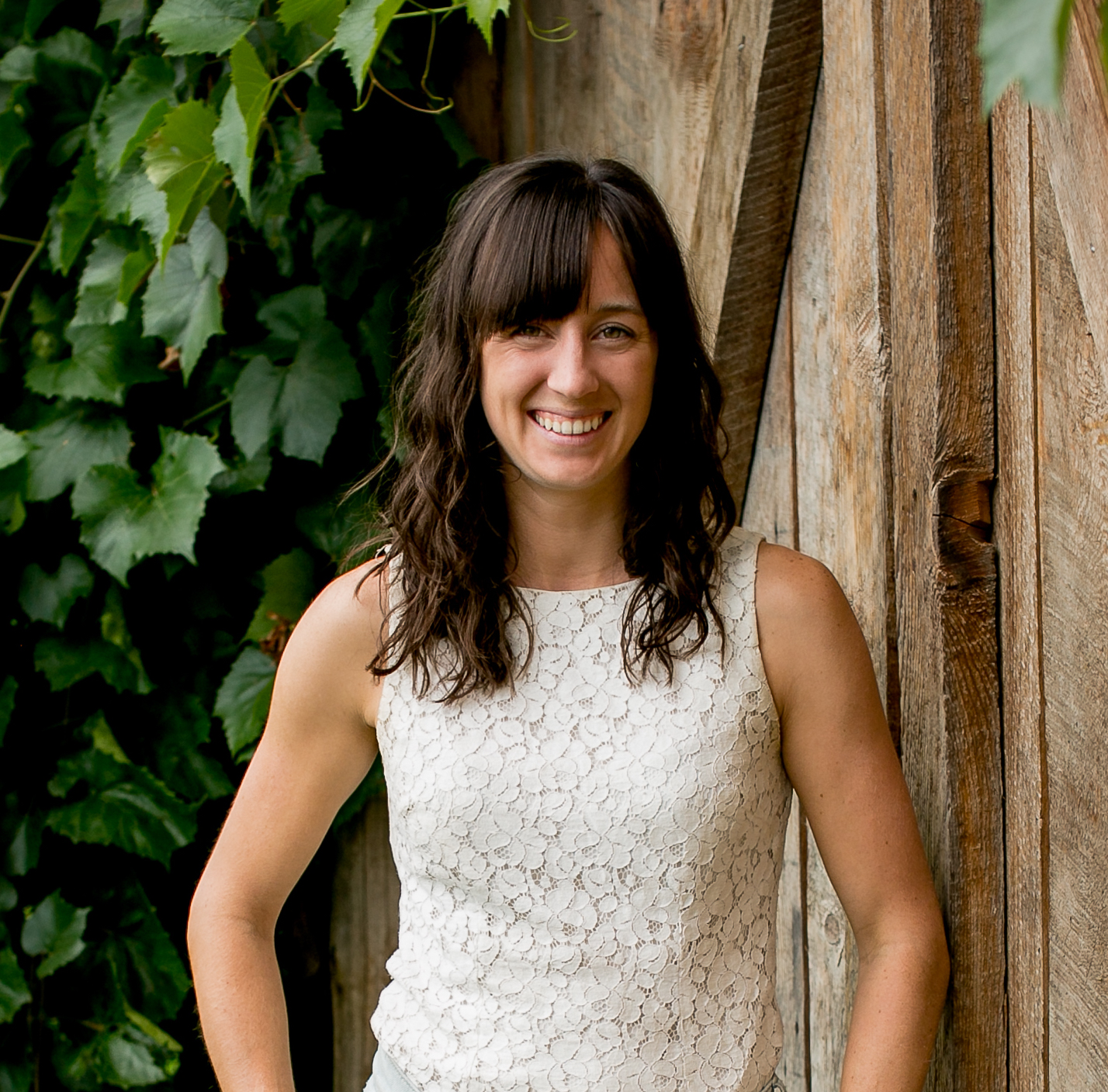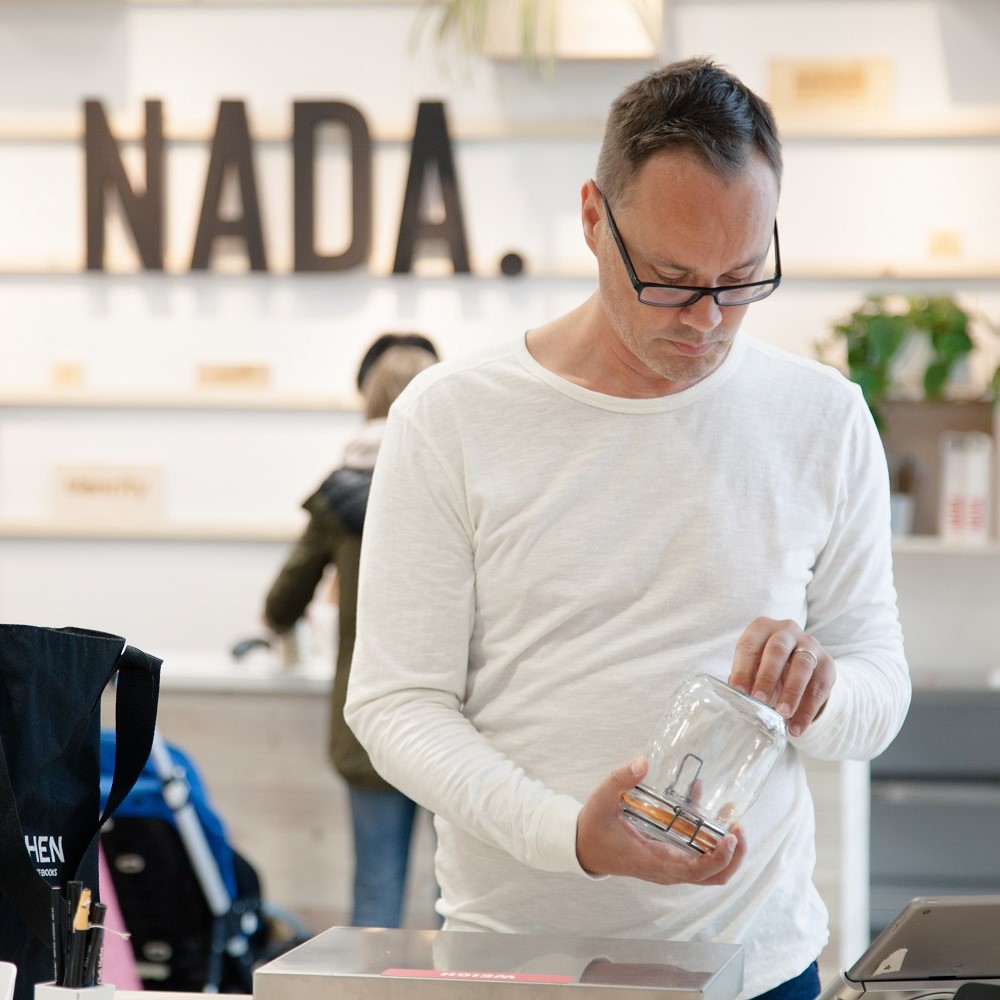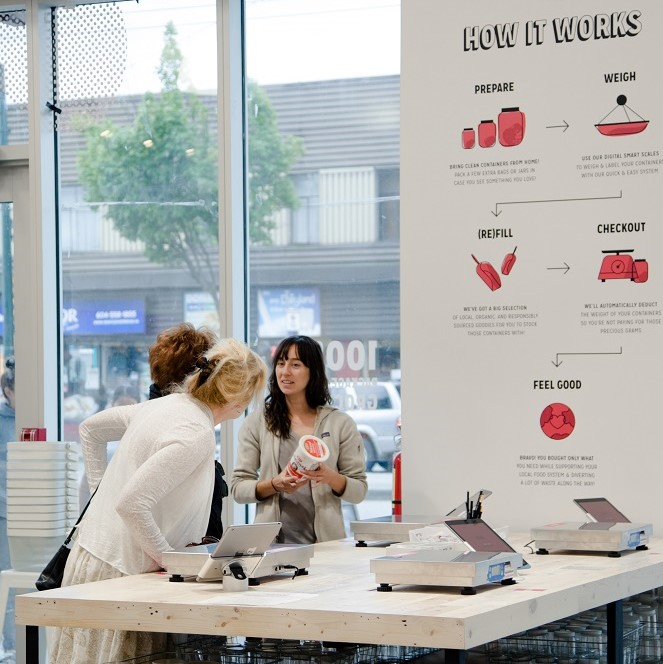From startups to restaurants to high-tech corporations, women are taking the business world by storm and leaving their mark. Bay Street Bull talks to female business leaders about their life, passions and how they became girl bosses in their respective fields. CEO of Nada, Brianne Miller, talks about her personal experiences as a marine biologist, reducing plastic use and opening Canada’s first package-free grocery store.
Over 100,000 marine animals die each year from ocean plastic pollution (some plastic bags can kill more than one animal due to its’ longevity). Zero-waste encourages better waste management and prevention of waste by designing more products for reusable purposes—which helps reduce trash in landfills, incinerators or the ocean.
Since its public rise in the 2000s and the debut of Zero Waste Home by Bea Johnson (a step-by-step guide to diminish a family’s footprint) in 2013, zero-waste lifestyle choices have expanded into a global movement.
As a marine mammal biologist, Brianne Miller was travelling to places around the world—some extremely remote—studying coral reefs, and tropical fish. While visiting these places, Miller says, “it became apparent very quickly how global and widespread the plastic pollution problem was.”
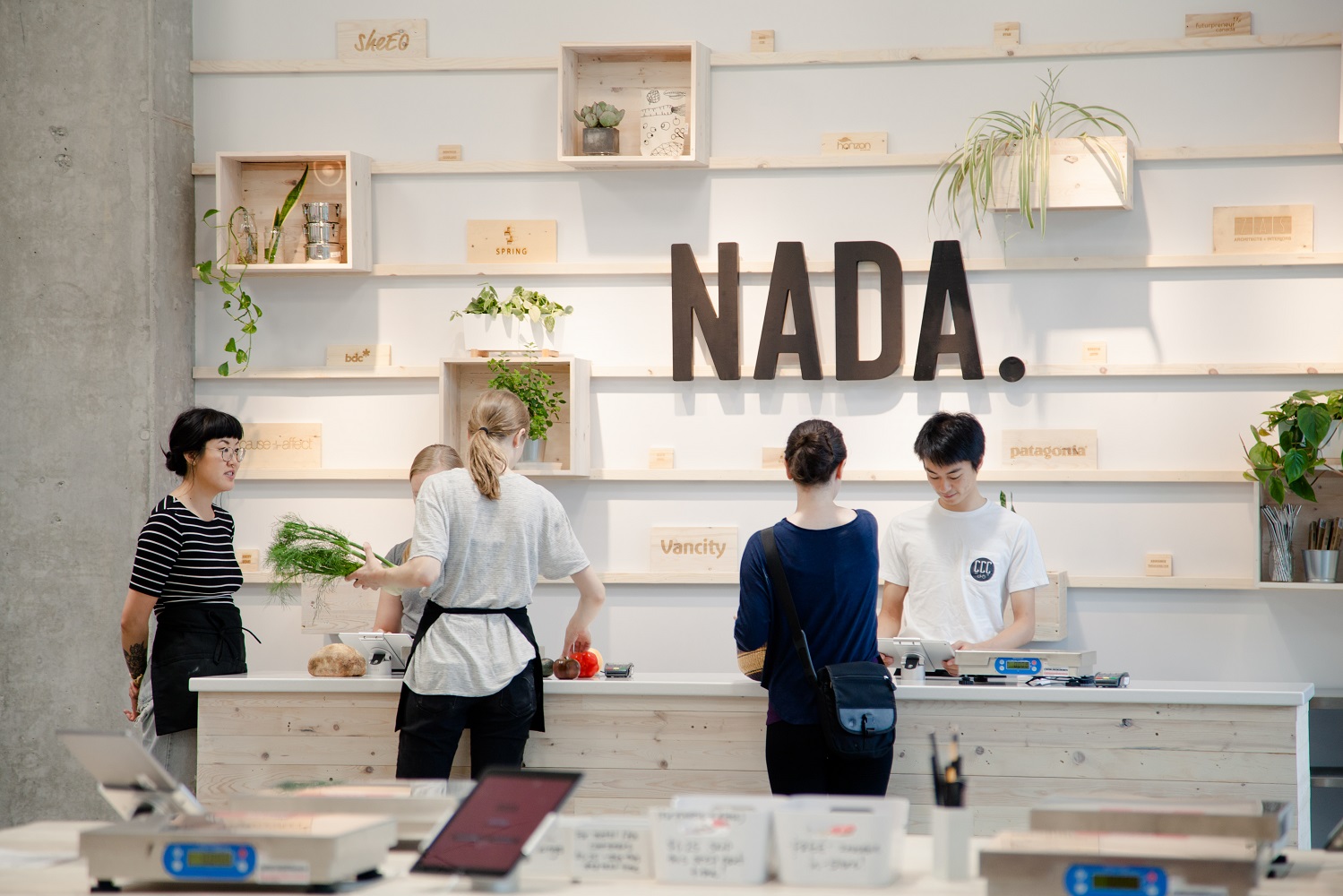

Later, Miller moved to Vancouver to study the impacts of ocean noise (produced by shipping goods around the world) on the Southern Resident Killer Whale population. During her life, including her decade-long career, Miller says “I haven’t been on a single dive, hike or boat trip where I haven’t seen plastic floating around. It’s been really hard to turn a blind eye to it.”
Instagram will load in the frontend.
While living in Vancouver, Alison Carr—who was studying waste in her final seminar classes at the University of British Columbia—reached out to Miller after hearing her package-free grocery shopping pitch at a Zero Waste event. Miller and Carr both wanted to reduce their garbage and were surprised package-free shopping hadn’t existed yet.
After a few pop-up stores and seeing a demand for it, Miller and Carr opened Canada’s first package-free grocery store, Nada, in June 2018. The store carries everything from groceries, to cleaning supplies, to personal care items—and includes a package free café with no disposable cups or cutlery.
How does it work?
The grocery store tracks the weight of customers’ containers and subtracts the price at the checkout. The digital system combines modern technology and inspiration from Miller’s grandparents, who lived during an economic depression and reused nearly everything, including the same paper flour sack her grandma used for grocery trips for 20 years.
The UN states we have 12 years to reverse the effects of climate change. Nada’s mission “to cultivate a better world by inspiring people to change the way they shop for groceries,” checks off a few boxes on the UN’s list of Sustainable Development Goals: climate action, clean water and sanitation, sustainable cities and communities, responsible production and consumption, and life below water.
Miller encourages customers to bring their reusable containers to the store, but if they happen to walk in or haven’t heard of Nada, jars are available and if they stop by the café, they can pick up a reusable mug for no additional charge. The store also uses a supplier-container-return system—coordinating pickups of empty containers and swapping them for the full ones with hundreds of suppliers.
Here, a conversation with Miller about her work, inspiration, and how going waste-free has impacted her life.
Where did your vision for Nada spark?
I haven’t been on a single dive, hike or boat trip where I haven’t seen plastic floating around. It’s been really hard to turn a blind eye to it. Through a lot of my research and work, I realized a lot of problems with various species are linked to our food [production and distribution] systems. That was the jump to try to support a sustainable food system.
I worked in two separate areas, The Gulf of Mexico and The Gulf of Saint Lawrence, where there are really large dead zones—areas where there is no oxygen—which means that no marine life can live there. Often it’s a result of industrial agriculture such as pesticides and fertilizers that flow into our rivers, and make our way into the ocean. That was one thing, along with overfishing and bycatch, that are linked to one of our major sources of food and protein.
What kinds of products does Nada carry?
We’re essentially a full-fledged grocery store. The average family that does the majority of their cooking at home can do their entire grocery shop with us. We have more than 750 products. We’ll have more than 1000 by the end of the year.
We also have a lot of things you might not think you’d be able to get package free—oils, honey, molasses, kinds of vinegar, condiments, dips. Lots of things are made in house as well. For example, we take the tops of carrots and make carrot top pesto.
The whole goal of the café is to reduce potential food waste from the grocery side, so we’re catching nearly everything before it goes bad and turning it into soups and smoothies. We do lots of things in our surplus too, we discount it first and try and promote the sale of imperfect fruits and vegetables.
How has going waste-free impacted your life?
From a personal standpoint, it’s been really fun and interesting, and from a saving perspective, I’ve saved so much money. I think differently about my purchases, whether I need it or if there’s a better way I can purchase it.
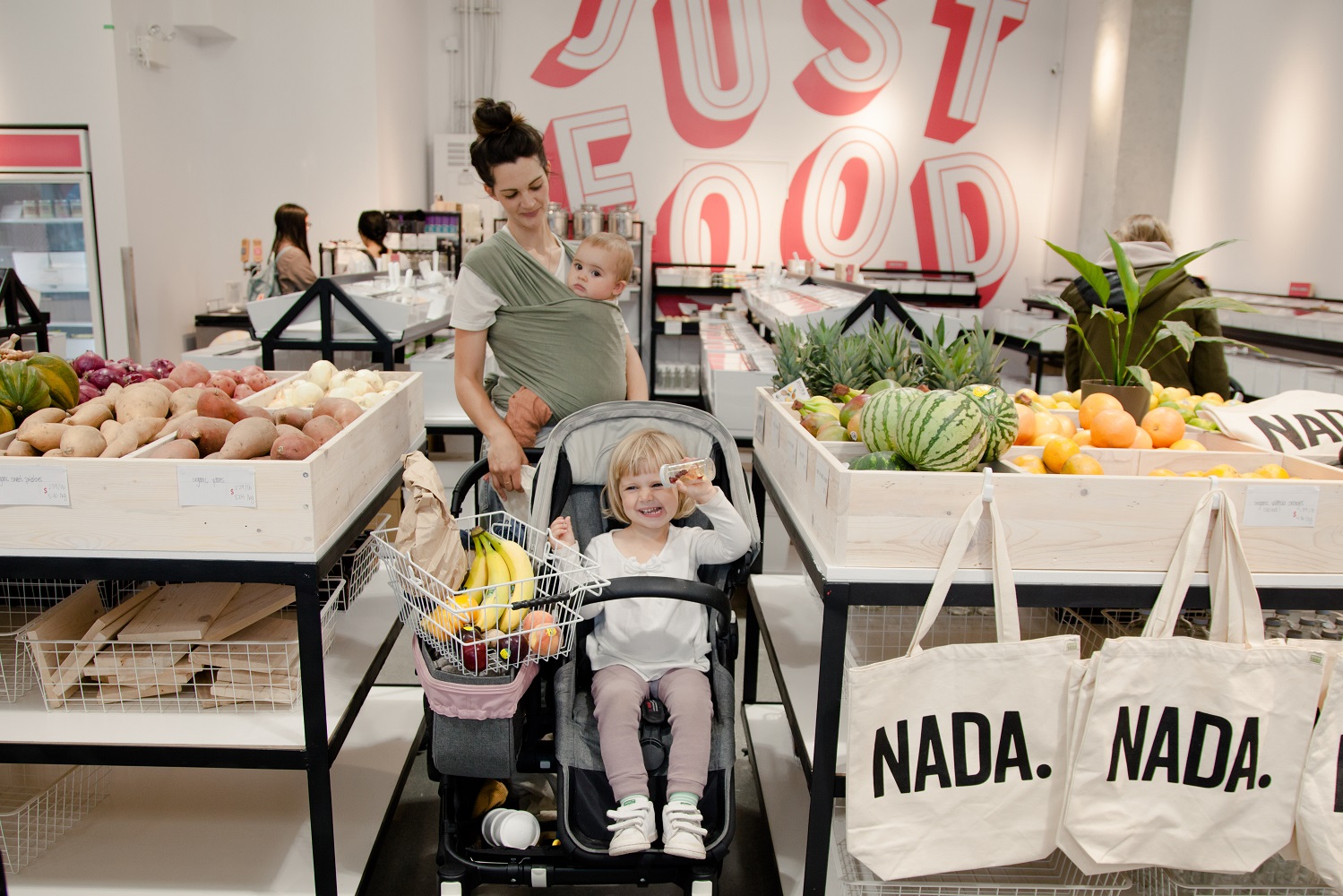

For those who don’t understand the zero-waste movement, how important is it to join the movement?
It’s one of the most important things we can do. In terms of climate change, one of the most important things the average person can do is reduce their consumption and driving.
The zero waste movement focuses a lot on plastic pollution obviously, but there are a lot of other components to that, I think it’s an inspiring movement that’s empowered a lot of people to make small changes in their everyday lives, that really do add up. We don’t need a handful of people reducing their waste completely—we need millions of people starting to reduce their waste, at least a little bit.


